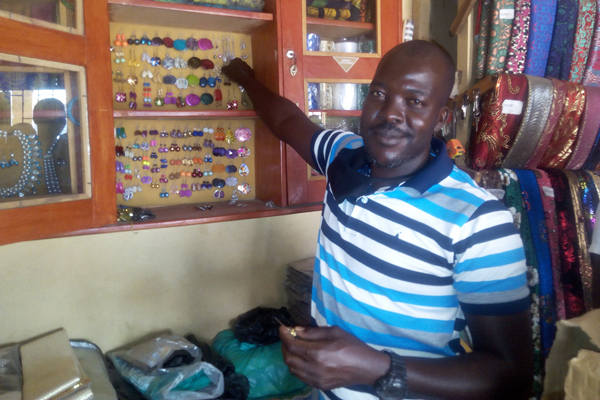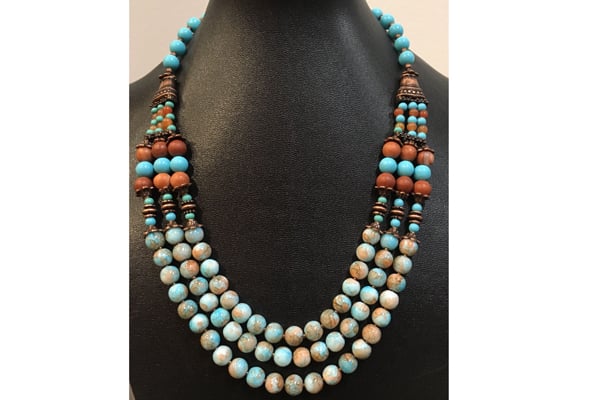Ojara grows jewellery business from scratch

Denis Walter Ojara displays his products. PHOTOS | CISSY MAKUMBI
What you need to know:
- Market. In order to attract and retain customers, Denis Walter Ojara uses social media to market his jewellery brand. To maintain his network of customers, plans are underway for Ojara to open an email newsletter that he will use to send out and be able to sell online.
- With the business growing, the buzzing entrepreneur intends to advertise his business with local broadcast stations.
On Queens Avenue, Eastern Division in Gulu City, a visible write up at one of the shops reads, Lacan Kwo ki lwete, literally meaning a poor person feeds on his fingers.
Upon entering the shop, one’s eyes are immediately arrested by polished products ranging from earrings, necklaces to bracelets.
The products are made by a 35-year-old Denis Walter Ojara, who holds a bachelor’s degree in guidance and counselling from Kyambogo University.
Dream
“I first started making jewellery as a hobby when I was a boy. My very rudimentary jewellery somehow became popular with family and older friends of the family and they actually bought some of my early jewellery pieces. From childhood, I was always very encouraged to continue with my art,” says Ojara.
Ojara has never gone to any vocational training school to learn what he does, but the keen observation whenever his maternal aunt was making necklaces, earrings and bracelets, is the reason as to why to date he has taken the skill to another level.
He attributes his quality made products to his childhood love of making toys from wires, something that also earned him beatings from his mother who argued that he could not do his chores as assigned.
“While in Senior Four vacation in 2004, it so happened that I stayed with my maternal aunt who was making beads and as I watched her making them, when she was away for a trip in Tanzania, I gave it a try,” he says.
“Upon her return, she could not believe looking at what I had made, and she asked me where I had learnt the beads crafting from and my answer was it was through what I saw her doing,” Ojara explains.
Growth minus bank support
Getting access to finance is still a major challenge for small scale businesses in northern Uganda. As a jewellery designer, Ojara has tried to apply for loans but has never been successful.
“Financing your business in Gulu is not always easy, except if you get a private investor that believes in you,” he says.
To grow his business without a loan, Ojara had to look inward. “I told myself, ‘you are going to save, you are going to invest and you are going to grow your own money’. Now, I am at a point where if I want to get a major project done, I start small. It’s a longer process but that’s just the best option.” “Before, local jewellery designers were considered unskilled artisans, but now, we are seen as professionals because we are actually earning good money for our craft,” says Ojara. “It has taken consistency, upping our game and ensuring that we are also offering value and showing why we should be recognised.”
Raw material
Materials used by most jewellery makers are largely imported from China, except for beads which are locally sourced from northern and eastern parts of the country. Ojara says the cost of importing these materials, especially if they are of high quality, inflates the price of the finished jewellery product.

Materials used by most jewellery makers are largely imported from China, except for beads which are locally sourced from northern and eastern parts of the country.
“I make sure I use unique materials for better products. I do not want a situation where the quality of my product will be compromised. Every week, I spend about Shs3m on stocking local beads,” he says. Ojara says he is not bothered when people say his products are expensive. “I consider that they are not my client. First of all, I offer a personalised service. Secondly, my jewellery designs are exclusive, meaning: they are original designs by me. So I am selling exclusivity, quality and good craftsmanship. Now, these other people that are doing it cheaper are not selling their original ideas. But if you know the worth of your sweat and creativity, you will never sell yourself short.”
Labour
Ojara does the crafting alone, his siblings are into other business.
“My sister is in charge of selling gomes in the same shop and at times, I look at the gomes in the shop and I make necklaces, earrings and bracelets that match with them so that if a customer comes and is interested, they can buy the whole set,’’ says the solopreneur.
Market
In order to attract and retain customers, Ojara uses social media to market his jewellery brand. To maintain his network of customers, plans are underway for Ojara to open an email newsletter that he will use to send out and be able to sell online.
With the business growing, the buzzing entrepreneur intends to advertise his business with local broadcast stations. Every time he appears on local radios, Ojara will not leave without mentioning his jewellery business.
“I currently sell my jewellery online and at my shop in Gulu City. Before Covid-19, tourists both domestic and foreign accounted for 50 per cent of my sales I was selling my products to tourists. The trend has since changed about 75 per cent of my orders come from locals,” he says.
Positives
“I have found that spending on advertising in my business has been profitable and has brought in more traffic, and more sales. I have also chosen to market my jewellery through email marketing, social media and word of mouth, which has worked very well for me. Maintaining relationships with repeat customers is very important to me, so I use social media very intentionally and I really enjoy connecting with loyal customers through various social media outlets and through email,” says Ojara.
No regrets
On the flip side, Ojara says some good decisions he made were to use social media for marketing. Using social media to market his brand has also helped him connect with other business owners and artists. “Social media helped me gain many loyal followers,” he says.
“Growing this business has been through consistency, constant improvement and honing my creative skill. It has been through networking and meeting the right kind of people that changed my disposition about my work. Before now, I didn’t take it seriously. But now, it is what I am going to retire to,” he says, adding: “It wasn’t tough like how other entrepreneurs will say their journey started off – maybe because I didn’t think it was going to grow this big. I wasn’t unnecessarily anxious over anything. I wasn’t anxious to make sales, meet deadlines or get clients.”
Lessons
One of the important lessons Ojara has learnt in his business is not to envy others. “Mind your own business and cultivate it to become bigger and better. When you do, in no time you will get to that level you aspire to and even surpass it. Rather than envy another person, learn how to get those things from the other person and turn your envy into desire and collaboration.”
In the future, Ojara is not ruling out looking to partner with business associates to cater for foreigners who are not able to come to Uganda but are fans of anything African that is contemporary and beautiful. “We hope to do business on a bigger scale, whereby we can cater for a different class of customers.”
Challenges
However, with new heights came new challenges. The first major hurdle Ojara faced in his business was client management. While jewellery making wasn’t his first foray into business, he soon discovered that each business is unique. He says his business has been hit by the Covid-19 pandemic. “Most people used to buy my products for functions such as weddings, but the pandemic has not spared me,” he says. He also has to juggle between farming and tending to his shop. Sometimes, Ojara says he loses customers while tending to his farm. He grows vegetables on a commercial basis.
Prices
The prices of his products differ according to material. For instance a single layer necklace purely made of local beads costs as little as Shs4,000. Ojara charges Shs15,000 per bracelet.




